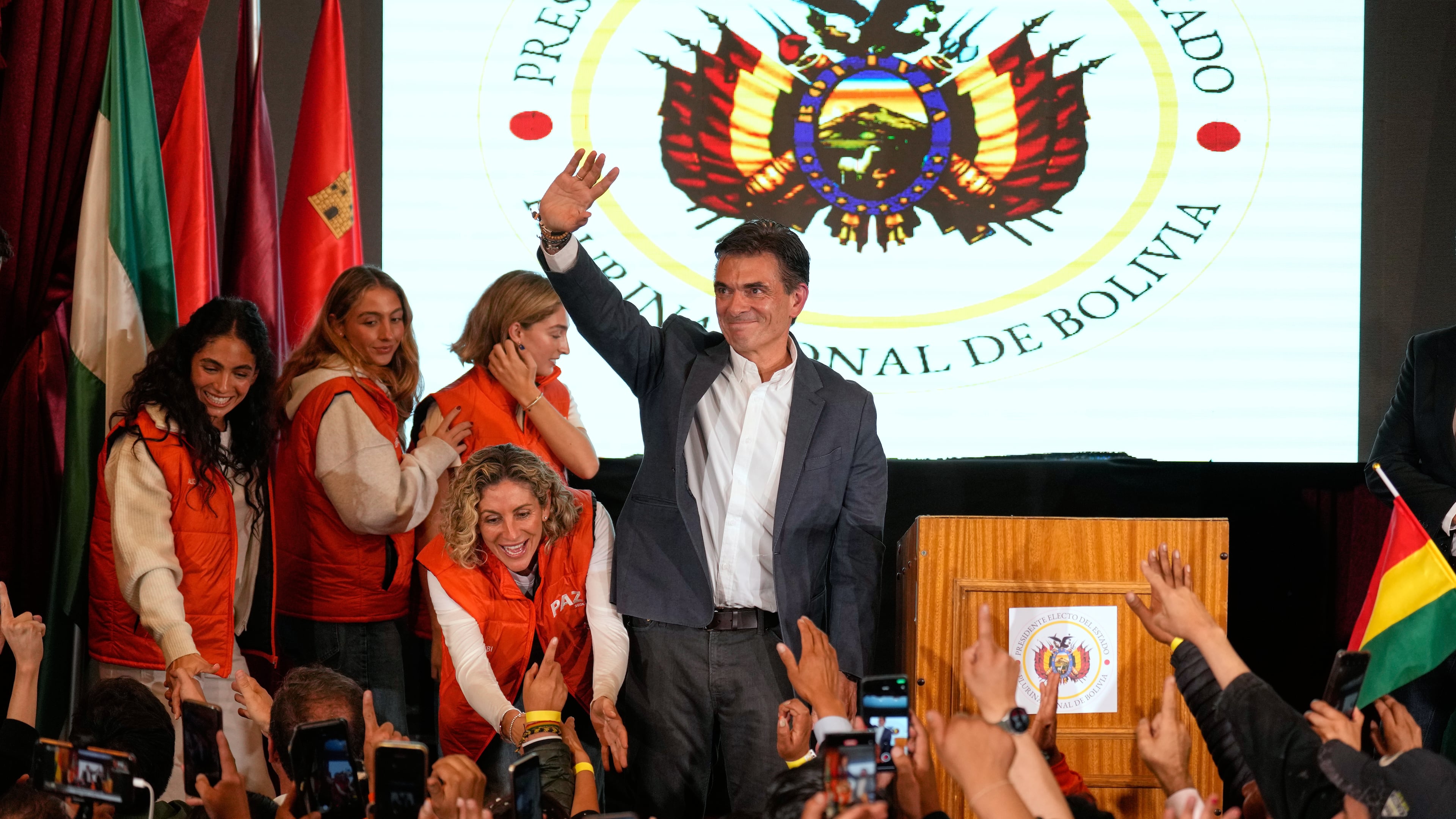Centrist Rodrigo Paz wins Bolivia's presidential runoff, topping right-wing rival

LA PAZ, Bolivia (AP) — Rodrigo Paz, a centrist senator who was never a nationally prominent figure until now, won Bolivia’s presidential election on Sunday, preliminary results showed, galvanizing voters outraged by the country’s economic crisis and frustrated with 20 years of rule by the Movement Toward Socialism party.
“The trend is irreversible,” Óscar Hassenteufel, the president of the Supreme Electoral Tribunal, said of Paz's lead over his rival, former right-wing President Jorge “Tuto” Quiroga.
Paz won 54% of the votes, early results showed, versus Quiroga's 45%.
Paz took the podium Sunday night flanked by his wife, María Helena Urquidi, and four adult children. The hotel ballroom went wild, with people shouting his name and holding phones aloft.
“Today, Bolivia can be certain that this will be a government that will bring solutions,” he told supporters. “We extend a hand to govern for the good of the country.”
Shortly after the results came in, Quiroga conceded to Paz.
“I've called Rodrigo Paz and wished him congratulations,” he said in a somber speech, prompting jeers and cries of fraud from the audience. But Quiroga urged calm, saying that a refusal to recognize the results would “leave the country hanging.”
“We'd just exacerbate the problems of people suffering from the crisis,” he said. “We need a mature attitude right now.”
Paz and his popular running mate, ex-police Capt. Edman Lara, gained traction among working-class and rural voters disillusioned with the unbridled spending of the long-ruling Movement Toward Socialism, or MAS, party but wary of Quiroga's radical 180-degree turn away from its social protections.
“It’s time to unite, it’s time to reconcile,” Lara told supporters after learning of his win, taking a more conciliatory tone than usual. “Political divisions are over.”
Paz’s victory sets this South American nation of 12 million on a sharply uncertain path as he seeks to enact major change for the first time since the 2005 election of Evo Morales, the founder of MAS and Bolivia’s first Indigenous president.
Although Paz plans to end Bolivia’s fixed exchange rate, phase out generous fuel subsidies and reduce hefty public investment, he says he’ll maintain MAS-style benefits and take a gradual approach to free-market reforms, in hopes of avoiding a sharp recession or jump in inflation that would enrage the masses — as has happened before in Bolivia.
Morales’ effort to lift fuel subsidies in 2011 lasted less than a week as protests engulfed the country.
Paz inherits an economy in shambles
Paz's supporters erupted into raucous cheers and ran into the streets of Bolivia's capital, La Paz, setting off fireworks and honking car horns. Crowds thronged a hotel downtown where Paz was expected to speak, some shouting, “The people, united, will never be defeated!"
“We feel victorious,” Roger Carrillo, a volunteer with Paz's party, said by phone from eastern Bolivia, where he was rallying a celebratory caravan. “We know there is work ahead of us but we just want to enjoy this moment.”
Behind the celebrations, Bolivia faces an uphill battle.
Since 2023, the Andean nation has been crippled by a shortage of U.S. dollars that has locked Bolivians out of their own savings and hampered imports. Year-on-year inflation soared to 23% last month, the highest rate since 1991. Fuel shortages paralyze the country, with motorists often waiting days in line to fill up their tanks.
To make it through even his first months, Paz must replenish the country’s meager foreign currency reserves and get fuel imports flowing.
Shunning the International Monetary Fund — an organization that has aroused political resentment in Bolivia before — Paz has pledged to scrape together the necessary cash by fighting corruption, reducing wasteful spending and restoring enough confidence in the country's currency to lure U.S. dollar savings out from under Bolivians' mattresses and into the banking system.
In contrast, Quiroga advocated relying on the IMF for a shock treatment package of the kind Bolivians came to know and fear in the 1990s.
But his stated reluctance to slam on the fiscal brakes — with promises of cash handouts for the poor to cushion the blow of subsidy cuts — has led to criticism.
“It’s just so vague, I feel like he’s saying these things to please voters when fiscally it doesn’t add up,” said 48-year-old Rodrigo Tribeño, who voted for Quiroga on Sunday. “We needed a real change.”
An outsider with political experience
Although Paz, the son of former President Jaime Paz Zamora, who was in office from 1989 to 1993, has spent more than two decades in politics as a lawmaker and mayor, he appeared in this race as a political unknown. The senator rose unexpectedly from the bottom of the polls to a first-place finish in the August vote.
His party swept six of nine regional departments in the country, including the Andean highlands of western Bolivia and the large, coca-producing region of Cochabamba. Quiroga, by contrast, carried the wealthier eastern lowlands of Santa Cruz.
“There’s a very clear class difference. For Quiroga, you have people who’ve been in politics and in the economic elite for a long time — businesspeople, agro-industrialists,” said Verónica Rocha, a Bolivian political analyst. “In Paz's party, it's the opposite.”
